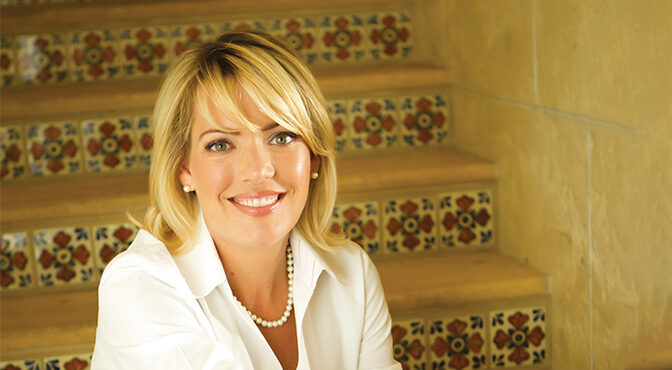Rachel Docekal Helping Local Nonprofits Adjust Their Fundraising Efforts For The Virtual Era
Since the inception of charitable giving, the mechanics have remained the same: Get a group of like-minded people together. Discuss common concerns. Seek resources for a course of action.
Then last year, people could no longer gather together. For many organizations, it was a catastrophic situation, yet others knew of Rachel Docekal’s long career helping nonprofit organizations. Her firm was able to help groups overcome lockdowns and quarantines, which often had a drastic effect on charitable giving.
After years in the in-house philanthropic and nonprofit fundraising industry, Docekal, a longtime Wellington resident, formed her own company, the Lyrae Group, to fulfill a service opportunity. Her former employer, the Hanley Foundation, became her firm’s first client.
“We are typically developing and coordinating about six major philanthropic or nonprofit events at any given time,” Docekal said. “We take an organization from the present to what is possible.”
Docekal has a doctorate in organizational management and has spent years determining what organizations need immediately, as well as developing for them a future strategic planning process. She typically works directly with the CEO or a designated point person.
Moving to Wellington from Pennsylvania with her husband in 1998, Docekal has seen the community grow up around her.
“Every year is new and exciting, it is a really great place to live,” she said, adding that it is also a great location for her firm, both with fundraising, and also firms cycling back to have her help with future strategy.
“Many philanthropic organizations use a recipe, but one size doesn’t fit all,” Docekal said, stressing that the past year has proven that adage.
March 2020 upended the entire nonprofit fundraising industry.
“It was remarkable. Gatherings came to a complete halt,” Docekal recalled. “Nonprofits provide essential services, and the audiences served by them are being provided critical services that people can’t do without.”
Those funding needs remained, even though the world had shut down. “Each organization’s needs are unique, but all require funding and resources,” she said.
The first event on her schedule after the shutdown was a golf tournament, which Docekal quickly rebranded as “Putt in Your Pajamas.”
“We were able to pivot to a different type of event overnight,” Docekal said.
With clever direct mail pieces and support collateral with a fun theme, highlighting that this was an event where you could stay home in your most comfortable attire and participate on your own schedule, the event was a success. “It turned out to have actually raised slightly more money than the previous year,” Docekal said.
Following events also went full virtual, with the same creative style of promotional pieces.
“We’ve held virtual silent and real auctions with more planned,” Docekal said.
These types of events worked so successfully that other organizations have followed in the Lyrae Group’s wake. “Others are now emulating us,” she explained.
Docekal said that the key to success during these challenging times is to work within the everyday barriers and constraints to provide innovative solutions for new opportunities. “You have to move forward and focus,” she said.
In one notable example, for what is typically a sit-down dinner for the Lifesaver Scholarship Fund, direct mail was used. A letter was sent to past contributors who have helped send people for addiction treatment.
“The theme was a bundt cake decorated like a lifesaver, and the event had a live cash call,” Docekal said. “Nowhere did we ask for a donation, we just thanked them for their previous support, and the donations beat all records.”
Docekal has also worked on organizing events not directly tied to fundraising. Some events distribute food such as rice from Florida Crystals, school supplies and clothing, or provide physicals for children requiring mobile services, as many of them or their parents did not have access to a car.
Work to support children in need is very important to her. “There are severe challenges, and the pandemic could set back children,” Docekal said.
The group also set up a walk-up center to provide appointments for the Health Care District to eliminate some of the required travel. “We provided walk-up services in the actual neighborhood,” Docekal said.
Docekal believes that as things get back to normal in the coming months, people will not return to all of their behaviors from the pre-pandemic era. “Things are changed forever,” she said.
This will likely mean that events will include both physical and virtual components.
“People are eager to get together again, so you’ll have the in-person component,” Docekal said. “Smart organizations will embrace the technology and use techniques [learned over the past year]. Participation on consulting boards is at an all-time high. It is a ‘happy accident.’ The donors have been acclimated to use these virtual events.”
This means that busy people will be able to participate in fundraising events as they see fit.
“People don’t have to travel and lose the travel time to and from a meeting or event, they just log on and participate,” Docekal said.
For more information about Rachel Docekal and the Lyrae Group, visit www.lyraegroup.com.
